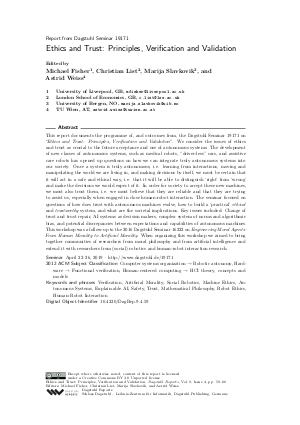Ethics and Trust: Principles, Verification and Validation (Dagstuhl Seminar 19171)
Authors Michael Fisher, Christian List, Marija Slavkovik, Astrid Weiss and all authors of the abstracts in this report
-
Part of:
Issue:
Dagstuhl Reports, Volume 9, Issue 4
Part of: Volume: Dagstuhl Reports, Volume 9
Part of: Journal: Dagstuhl Reports (DagRep) - License:
 Creative Commons Attribution 3.0 Unported license
Creative Commons Attribution 3.0 Unported license
- Publication Date: 2019-09-30
File

PDF
DagRep.9.4.59.pdf
- Filesize: 7.58 MB
- 28 pages
Document Identifiers
Subject Classification
Keywords
- Verification
- Artificial Morality
- Social Robotics
- Machine Ethics
- Autonomous Systems
- Explain-able AI
- Safety
- Trust
- Mathematical Philosophy
- Robot Ethics
- Human-Robot Interaction
Metrics
- Access Statistics
-
Total Accesses (updated on a weekly basis)
0Document
0Metadata
Abstract
This report documents the programme of, and outcomes from, the Dagstuhl Seminar 19171 on "Ethics and Trust: Principles, Verification and Validation". We consider the issues of ethics and trust as crucial to the future acceptance and use of autonomous systems. The development of new classes of autonomous systems, such as medical robots, "driver-less" cars, and assistive care robots has opened up questions on how we can integrate truly autonomous systems into our society. Once a system is truly autonomous, i.e. learning from interactions, moving and manipulating the world we are living in, and making decisions by itself, we must be certain that it will act in a safe and ethical way, i.e. that it will be able to distinguish 'right' from `wrong' and make the decisions we would expect of it. In order for society to accept these new machines, we must also trust them, i.e. we must believe that they are reliable and that they are trying to assist us, especially when engaged in close human-robot interaction. The seminar focused on questions of how does trust with autonomous machines evolve, how to build a `practical' ethical and trustworthy system, and what are the societal implications. Key issues included: Change of trust and trust repair, AI systems as decision makers, complex system of norms and algorithmic bias, and potential discrepancies between expectations and capabilities of autonomous machines. This workshop was a follow-up to the 2016 Dagstuhl Seminar 16222 on Engineering Moral Agents: From Human Morality to Artificial Morality. When organizing this workshop we aimed to bring together communities of researchers from moral philosophy and from artificial intelligence and extend it with researchers from (social) robotics and human-robot interaction research.
Cite As Get BibTex
Michael Fisher, Christian List, Marija Slavkovik, and Astrid Weiss. Ethics and Trust: Principles, Verification and Validation (Dagstuhl Seminar 19171). In Dagstuhl Reports, Volume 9, Issue 4, pp. 59-86, Schloss Dagstuhl – Leibniz-Zentrum für Informatik (2019)
https://doi.org/10.4230/DagRep.9.4.59
BibTex
@Article{fisher_et_al:DagRep.9.4.59,
author = {Fisher, Michael and List, Christian and Slavkovik, Marija and Weiss, Astrid},
title = {{Ethics and Trust: Principles, Verification and Validation (Dagstuhl Seminar 19171)}},
pages = {59--86},
journal = {Dagstuhl Reports},
ISSN = {2192-5283},
year = {2019},
volume = {9},
number = {4},
editor = {Fisher, Michael and List, Christian and Slavkovik, Marija and Weiss, Astrid},
publisher = {Schloss Dagstuhl -- Leibniz-Zentrum f{\"u}r Informatik},
address = {Dagstuhl, Germany},
URL = {https://drops.dagstuhl.de/entities/document/10.4230/DagRep.9.4.59},
URN = {urn:nbn:de:0030-drops-113046},
doi = {10.4230/DagRep.9.4.59},
annote = {Keywords: Verification, Artificial Morality, Social Robotics, Machine Ethics, Autonomous Systems, Explain-able AI, Safety, Trust, Mathematical Philosophy, Robot Ethics, Human-Robot Interaction}
}
